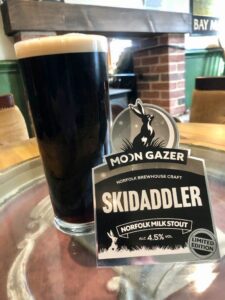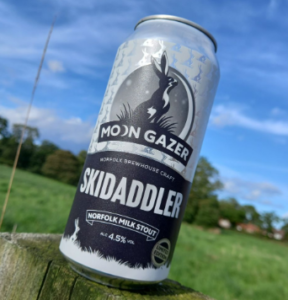We were delighted when our new milk stout – Skiddadler won Gold at a prestigious regional award when it was named champion in the dark beer above 4.4% abv category.
This award – held by the Society of Independent Brewers (SIBA) – was for the keg version of the stout – and covered borders form 7 counties across the East of England – so a tough category to win indeed.
The cask version has also been getting plaudits – offering as it does a smooth, sweet and sift bitterness option for a stout.
The award follows on from an earlier Silver award for the can version – so this new beer of ours is really grabbing the attention.
Why not try it in cask or can now – coming back soon in keg!


A reminder of how we created Skiddadler:
Time to rediscover the tradition of smooth, sweet stouts…Norfolk style
Well, it’s been a long time coming but we’re pleased to announce the addition of a milk stout to our Moon Gazer line-up.
We’ve been promising a stout for a long time, and to be perfectly honest I’m not entirely sure why its taken us this long – but hopefully you will agree it’s worth the wait.
So, time to discover the latest addition to our dark side!
Skidaddler is a very dark (think black) 4.5% abv milk stout which delivers a rich complexity of flavours balanced by the sweet smoothness achieved by the addition of lactose.
Now, whilst today you will find a plethora of milk stouts offering you an array of taste sensations from blueberry, salted caramel, peanut butter, marshmallow and heaven forbid banana – our Skidaddler follows the tradition of malt, hops and lactose.
Oh, and yes, I use the word tradition advisedly.
You would be forgiven for thinking these new milky stouts are the invention of today’s youthful craft generation. In fairness while brewers of the early 1900s wouldn’t be adding a cocktail of exotic fruits and sweet things to their brew – milky stouts first started appearing in the UK as early as the 1900s.
Back then they were hailed as a healthy tonic – not something condoned today – but also were the antidote to the then mainstream aged beers. Often tasting stale and quite frankly off at the turn of the century aged beers were losing popularity and beer drinkers were turning their attention to beers served fresh and young. Styles such as milds were rising to the fore and brewers seized the opportunity to bring milk stouts to the attention of drinkers in search something new.
After all, the lactose – which is the sugar found in milk – brings a smoothness and gentle sweetness to the beer. In layman’s terms lactose is a sugar found in the whey when cheese is produced and happily a sugar which the yeast used in brewing can’t be bothered to ferment. So, while most of the sugars from the malt are converted into alcohol the kind hearted yeast leaves us the lactose, for body and smoothness.
Blend this with a cocktail of malts and you can create something rather distinctive and special. For us at Moon Gazer we wanted the malts to shine – a backbone of Norfolk Maris Otter plays host to some German dark malts. Now, for a brewery which bangs on incessantly about the importance of local you may wonder why German malts.
The reason is one of added smoothness. The German’s – who are partial to a dark lager – wanted all of the darkness but none of the bitterness which comes from the roasting of malt. Some clever – or incredibly fussy brewer – soon worked out that the bitterness was in the roasted husk of the barley. Hey presto, simples – remove the husk and be left with just the flavour and colour.
That’s how we like it too.
We’ve blended a total of 5 malts to give a depth of flavour and mouthfeel, and merely flirted with the idea of hops. Yes, some hops were added for bittering – an Anglo-French alliance of British Challenger hop and some French Goldings. As for late addition hops there were none. When you have such a luxurious blend of malts why would you want to mask it with hops? No let the maltiness have its day in the limelight.
Mind you, we confess that it did take an effort of will bordering on the superhuman not to sneak just kilo or two of aroma hops in.
As for the name, as you would expect from Team Moon Gazer, its once again taken from a local name for a hare, presumably earned by the hare’s ability to move or leave quickly. Not entirely sure why but it just fits the bill. It suggests a cheekiness and a freshness and a drink full of surprises.
Mind you as to surprises of exotic fruits and confectionery we will leave that to the young ones. For us traditional simplicity is the order of the day.
Skidaddler is in 440ml can, cask and Key Keg – so look out for it.
